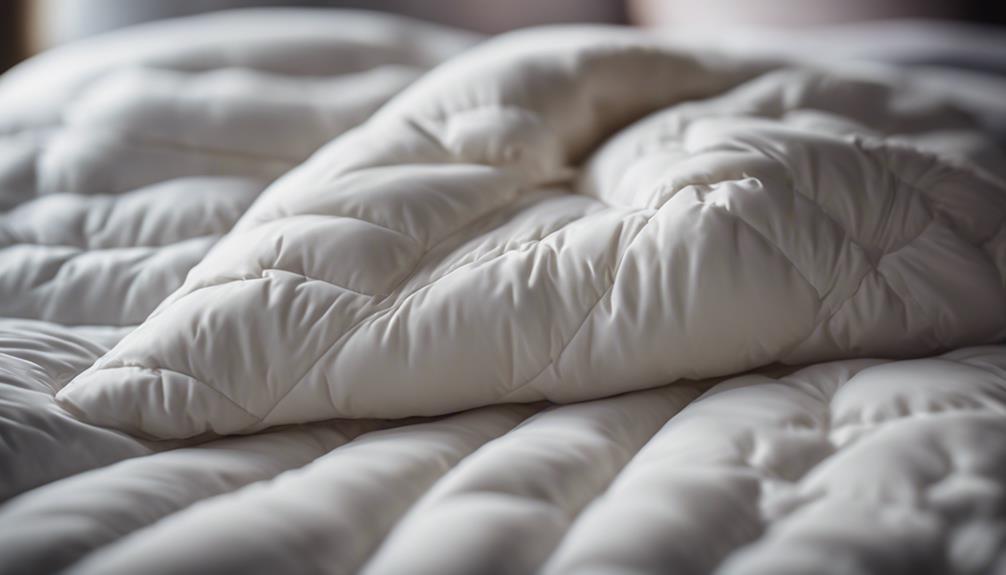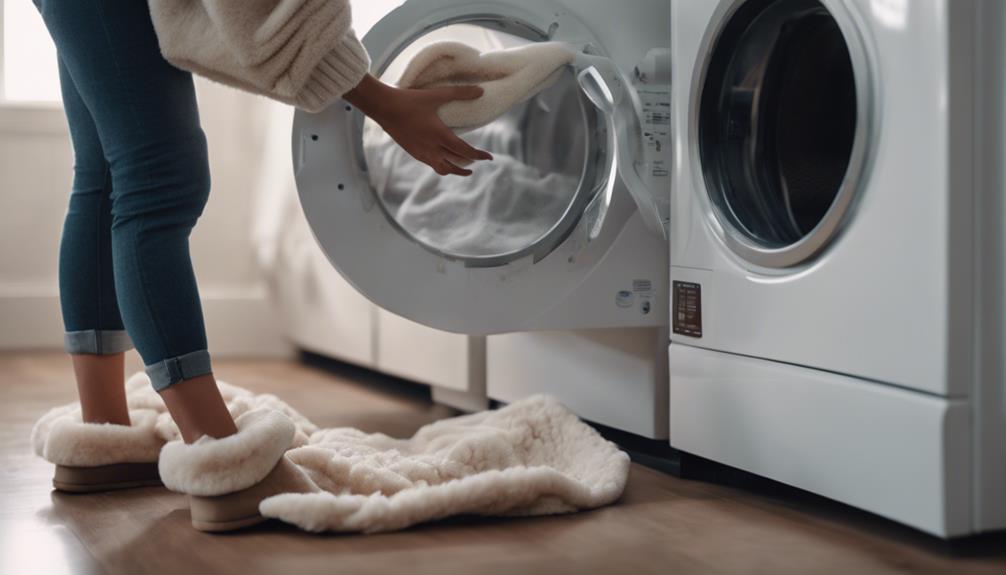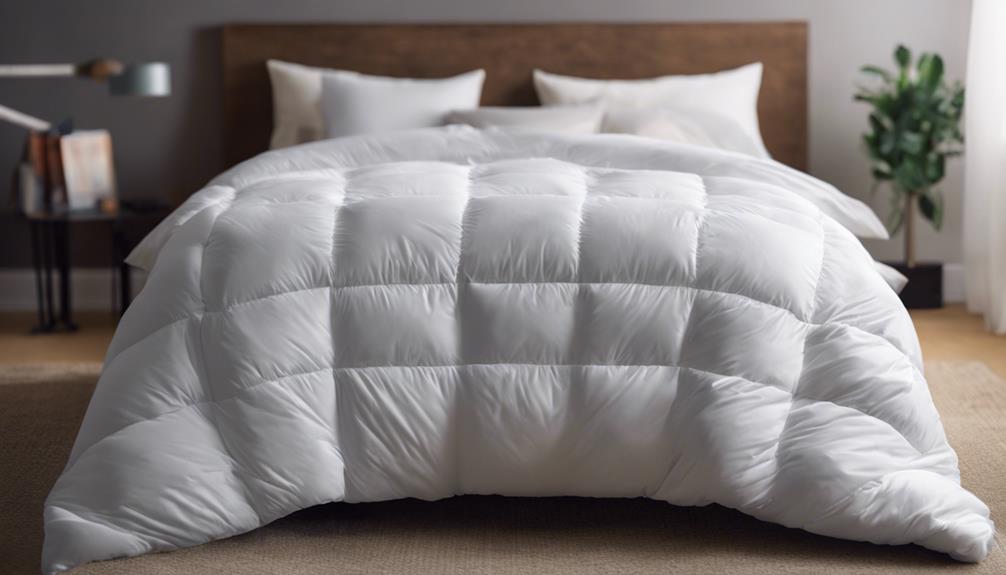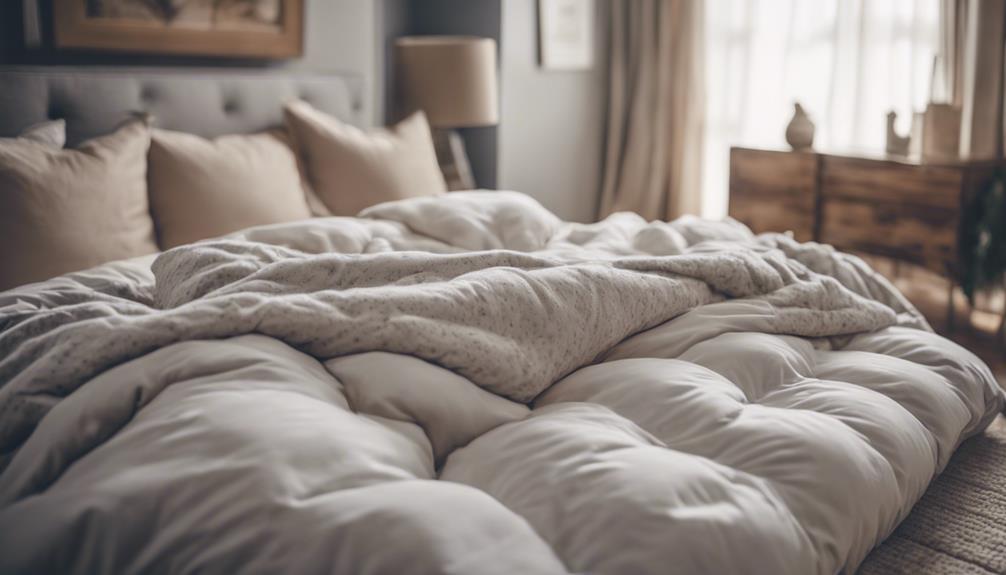Yes, a down comforter requires a cover to shield it from dust, allergens, and oils, while also adding an extra layer of warmth. The cover serves as a protective barrier, prolonging the life of the comforter and making it easier to clean. Additionally, it enhances the cozy and stylish look of your bedding set. Utilizing a duvet cover ensures that your comforter remains clean and has a longer lifespan.
Key Takeaways
- Yes, a cover is essential for a down comforter to maintain cleanliness and longevity.
- Covers act as a protective barrier against dust, allergens, and skin oils.
- They are removable and washable for easy maintenance.
- Choosing breathable materials like cotton or linen enhances comfort.
- Duvet covers add aesthetic appeal and style to the bedding ensemble.
Importance of Using a Cover
Using a duvet cover is essential for maintaining the cleanliness and longevity of your down comforter. A duvet cover acts as a protective barrier, shielding your duvet from dust, allergens, and skin oils that can accumulate over time.
These covers are typically made of cotton fabric, which isn't only soft and comfortable but also easy to clean. By using a duvet cover, you can protect your duvet from stains and spills, as washing a duvet cover is much simpler than cleaning a down comforter.
Additionally, the cover can add an extra layer of insulation, enhancing the warmth and comfort of your bedding. By investing in a duvet cover, you not only keep your duvet clean and fresh but also extend its lifespan, ultimately improving your overall sleeping experience.
The aesthetic appeal of a duvet cover can also transform the look of your bedroom, adding style and personality to your bedding ensemble.
Benefits of Covering a Comforter
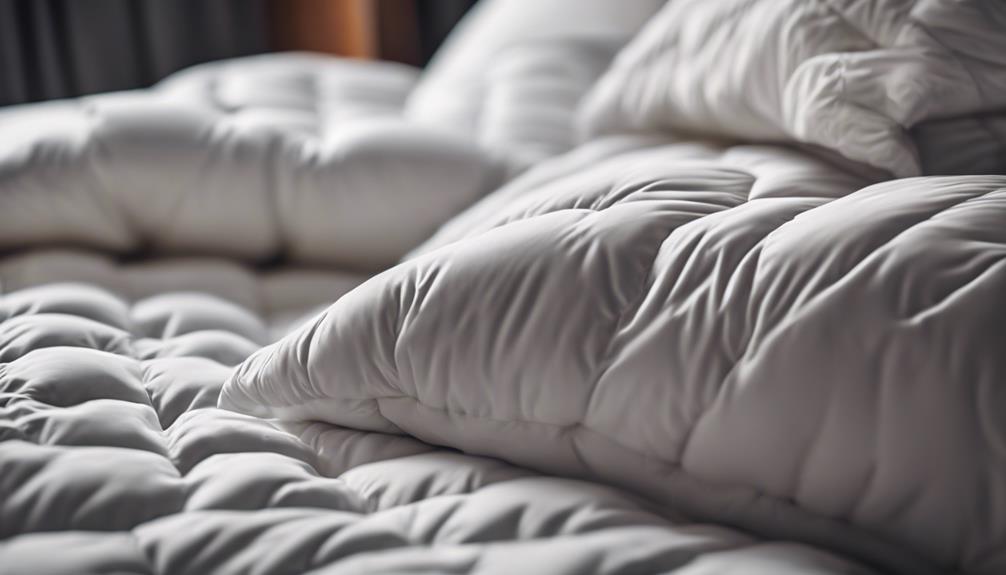
Essentially, covering a down comforter with a duvet provides numerous benefits that contribute to maintaining its cleanliness and extending its lifespan. A comforter cover, such as a duvet cover, acts as a protective barrier against dust, allergens, and skin oils, preserving the quality of the down comforter.
By using duvet covers, you can easily maintain cleanliness as they're removable and washable, reducing the frequency of washing the comforter itself. Additionally, duvet covers prevent issues like shedding for feather comforters, ensuring a comfortable sleeping environment.
Not only do duvet covers serve a practical purpose, but they also enhance the overall texture of the comforter casing and add an aesthetic appeal to the bedding. Essentially, utilizing a duvet cover is a simple yet effective way to protect and maintain down comforters, ultimately extending their longevity and ensuring a cozy night's sleep.
Maintenance Tips for Down Comforter Covers
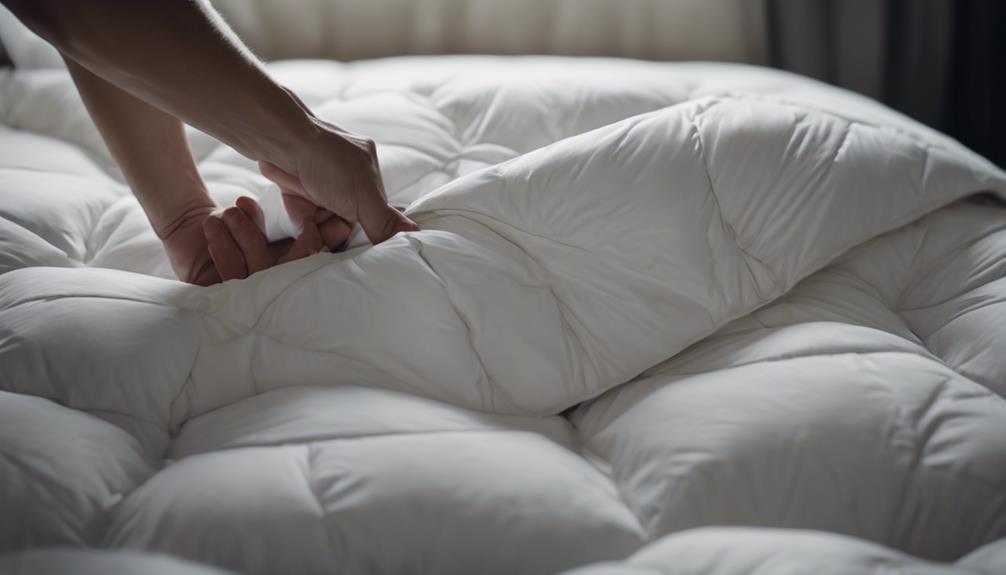
To prolong the life of your down comforter cover, regular washing and proper care are essential for maintaining its quality and cleanliness. Here are some maintenance tips for down comforter covers:
- Wash with Care: Follow the manufacturer's instructions for washing the duvet cover to prevent damage and maintain its integrity.
- Use Gentle Detergent: Opt for a mild detergent to avoid harsh chemicals that could affect the fabric of the cover.
- Avoid High Heat: When drying the cover, use low heat settings to prevent shrinkage and preserve the material.
- Rotate Covers: Having multiple covers allows you to rotate them, reducing the frequency of washing and extending the lifespan of each cover.
Choosing the Right Cover Material
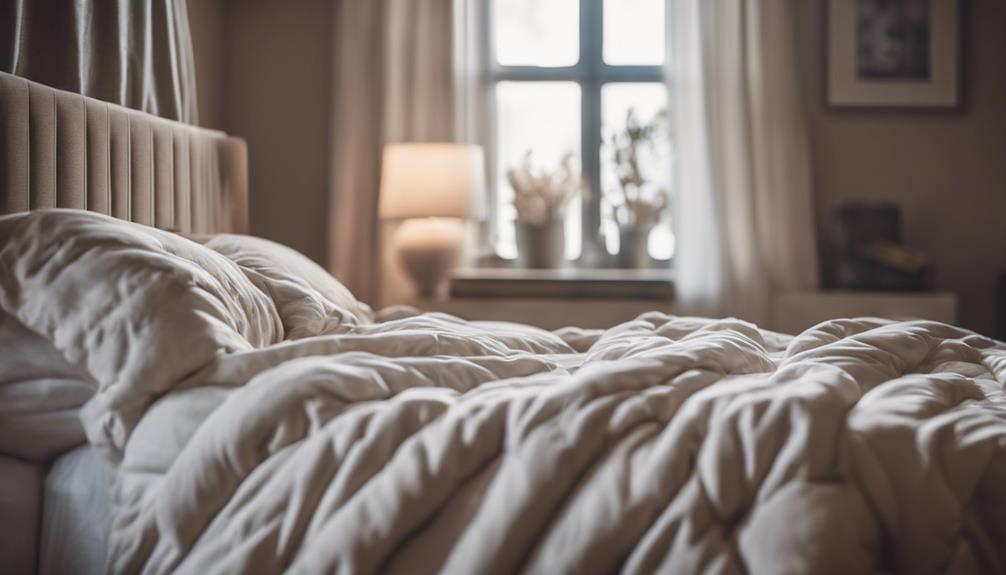
When selecting a cover material for your down comforter, it's crucial to choose breathable options like cotton or linen to guarantee proper airflow and comfort.
Avoid heavy fabrics such as velvet or upholstery-grade materials to prevent overheating during the night.
Look for covers with moisture-wicking properties and hypoallergenic features for temperature regulation and allergy prevention.
Cover Material Types
For superior quality and durability, contemplate opting for cover materials like Egyptian cotton when choosing the right cover material for your down comforter. Egyptian cotton fibers are spun finer, providing a softer and more comfortable cover.
Here are some cover material types to take into account:
- Percale: Lighter and more breathable option.
- Sateen: Offers a silky smooth surface for a luxurious feel.
- Linen: Known for its durability and moisture-wicking properties.
- Bamboo: Eco-friendly choice with natural antibacterial properties.
Selecting the appropriate cover material can't only enhance the comfort of your comforter but also elevate the overall aesthetics of your bedding.
Cover Material Care
Considering the longevity and comfort of your down comforter, prioritizing proper care for the cover material is essential. When choosing a duvet cover, opt for high-quality materials like Egyptian cotton for durability and softness. Egyptian cotton fibers are finer, resulting in a softer feel.
Percale or sateen covers are great options for a lighter and more breathable feel. Percale offers a crisp and cool sensation, while sateen provides a silky smooth surface.
It's advisable to select washable, sheet-weight fabrics such as cotton for easy cleaning and maintenance of the duvet cover. By choosing the right cover material and caring for it properly, you can enhance the comfort and lifespan of your down comforter.
Enhancing Comfort With a Duvet Cover
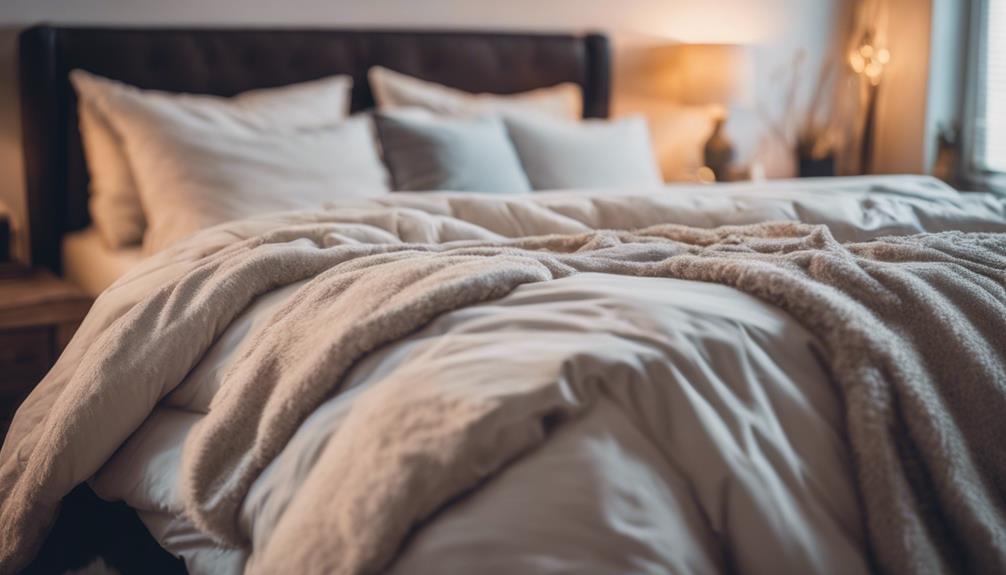
Enhancing comfort with a duvet cover elevates the sleeping experience while safeguarding your down comforter from dust and allergens. Duvet covers not only enhance comfort and cleanliness but also extend the lifespan of your down comforter by protecting it from potential damage.
Here are some key points to ponder:
- Protection: Duvet covers shield down comforters from dust, allergens, and skin oils, keeping them fresher for longer.
- Convenience: Washing a duvet cover is easier and more convenient than washing a down comforter, making maintenance simpler.
- Lifespan: By acting as a barrier, duvet covers help prevent wear and tear on down comforters, extending their usability.
- Aesthetic Appeal: Duvet covers not only provide practical benefits but also add a touch of style to your bedding ensemble.
Incorporating a duvet cover into your bedding routine can enhance your sleeping environment, ensuring a cozy and clean space for rest.
Covering for Allergen Protection
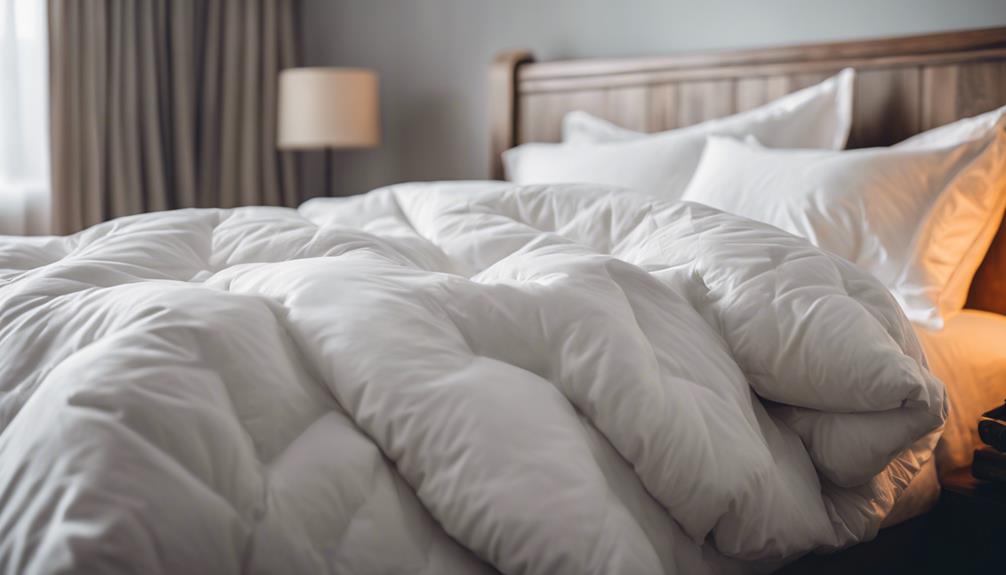
Covering your down comforter with a duvet cover provides a protective barrier against dust mites and allergens, enhancing the longevity and cleanliness of your bedding. Duvet covers act as a shield between your skin and the comforter, reducing exposure to allergens that can trigger reactions.
By using a duvet cover, you create a barrier that helps minimize the need for frequent washing of the down comforter, thereby maintaining its quality over time. These covers are designed to be easier to clean and maintain, simplifying the process of managing allergen protection for your down comforter.
Investing in a quality duvet cover not only safeguards against allergens and dust but also enhances the lifespan of your down comforter by providing an additional protective layer. This simple step can make a significant difference in the cleanliness and allergen protection of your bedding, promoting a healthier sleep environment.
Frequently Asked Questions
Do You Put Something Over a Down Comforter?
Yes, we usually put a duvet cover over a down comforter. It helps protect the comforter from dust, allergens, and skin oils.
Washing a duvet cover is simpler than washing the down comforter itself, and it can extend the comforter's lifespan.
How Do I Protect My Down Comforter?
To protect your down comforter, consider using a duvet cover. This helpful layer shields your comforter from dust, allergens, and skin oils, extending its lifespan.
Plus, washing a duvet cover is much simpler than washing the comforter itself. By using a duvet cover, you can enhance your sleeping experience, prevent shedding issues, and maintain the texture of your duvet casing.
It's a practical and effective way to care for your down comforter.
Can You Use a Comforter Without a Cover?
Yes, comforters can be used without covers, but it's not ideal. Without a cover, comforters are more susceptible to stains, dirt, and wear, which can reduce their lifespan.
Covers provide an extra layer of protection, helping to maintain the comforter's appearance and quality. While it's possible to use a comforter without a cover, using one is recommended to keep your comforter looking newer for longer.
Do You Cover a Down Alternative Comforter?
Yes, we cover our down alternative comforter with a duvet cover. It protects from dust, stains, and wear, extending its lifespan.
The cover adds style and is easily changed. With various colors and materials available, we can choose what suits us best.
Plus, the duvet cover provides an extra layer of warmth and comfort while we sleep. So, covering our down alternative comforter is a practical and cozy choice.
– Should I Use a Cover for My Twin Comforter if I’m using it on a Full Bed?
Yes, using a cover for your twin comforter on a full bed is a good idea. It will help keep the comforter in place and prevent it from shifting around on the larger bed. Plus, a cover can add a decorative touch to your bedding while also providing extra protection for your comforter.
Conclusion
To sum up, covering your down comforter is like putting a cozy sweater on a chilly day – it adds an extra layer of warmth and protection. Not only does it prolong the life of your comforter, but it also helps maintain its cleanliness and comfort.
By selecting the right cover material and practicing proper maintenance, you can guarantee your comforter stays fluffy and inviting for years to come.
So, don't forget to dress your comforter in its best cover!
